The banking industry in Singapore has witnessed significant growth in recent years, reflecting its status as a global financial hub. According to the Singaporean government’s annual financial reports, the country’s financial sector has grown by 4.8% in 2023, highlighting its resilience and adaptability in an ever-changing global economy. This sustained growth has led to an increased demand for efficient and robust software solutions, particularly in managing complex financial operations.
In the face of rapid digital transformation, I found that banks are recognising the need for integrated systems that can streamline their workflows, enhance data security, and ensure regulatory compliance. This is where Enterprise Resource Planning (ERP) systems come into play. ERPs provide a comprehensive solution to the intricate operational challenges faced by the banking industry.
Try our free demo to get hands-on experience and continue reading this article as we will explore the top 7 ERP software best for businesses in Singapore.
Key Takeaways
|
Benefits of ERP Software for the Banking Industry
ERP software offers a comprehensive solution, here are some of benefits to the banking industry that I curated for you:
- Enhanced Security: In an era where secure transactions are paramount, ERP software helps banking institutions protect sensitive customer data and financial records. With advanced encryption and access control features, ERP systems ensure that transactions and account details are secure, minimising the risk of data breaches.
- Real-Time Operational Monitoring: With the rise of digital banking methods, such as mobile banking, online banking, and ATMs, tracking financial operations in real-time is crucial. ERP systems offer real-time monitoring tools, enabling banks to closely oversee their activities without error, ensuring accurate and up-to-date information for informed decision-making.
- 24/7 Accessibility: Cloud-based ERP solutions offer banks the advantage of 24/7 data access. This not only empowers bank managers to control processes more efficiently but also keeps customers informed about their account details, upcoming billings, and EMIs, ensuring a seamless flow of operations.
- In-Depth Analytics: Accurate analysis is vital for planning and strategising in the banking sector. ERP systems offer business intelligence features that help banks analyse and evaluate key metrics, such as interest rates, compliance standards, and service charges. This analysis enables banks to maintain competitiveness and provide value to their customers.
- Customizable Solutions: ERP systems often offer customizable modules tailored to the unique needs of the banking sector. This customisation helps banks align their software capabilities with specific operational goals, improving efficiency, customer satisfaction, and regulatory compliance.
7 ERP Software for the Banking Industry Recommendation
ERP software can impact its functionality. Then, to achieve maximum efficiency, choosing the right ERP software is crucial. Here my recommendation of the best ERP software for the banking industry:
1. HashMicro
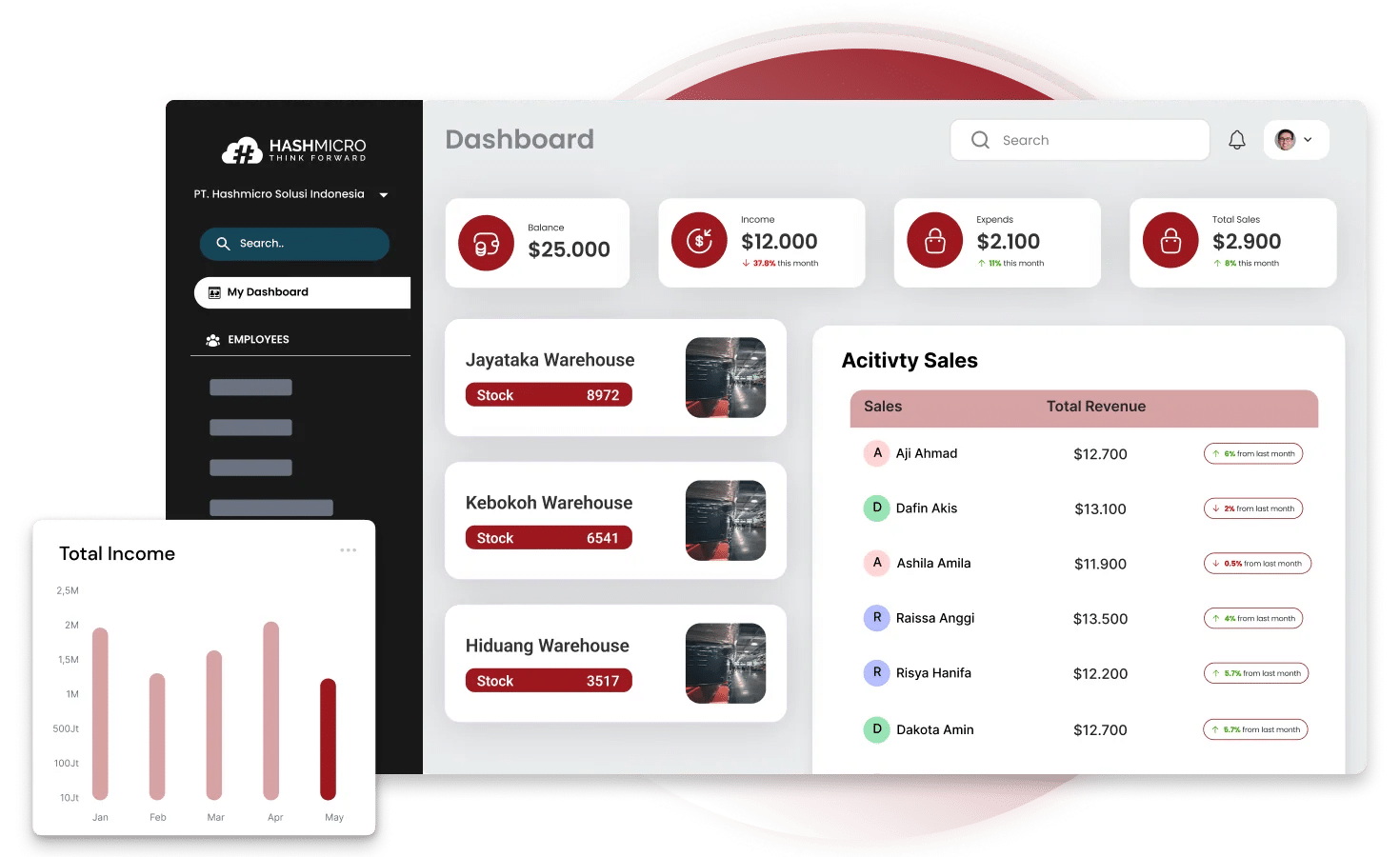
HashMicro is widely recognized as the best ERP software provider in Singapore, serving over 1,750 clients from world-class enterprises. The company offers a comprehensive suite of modules and features tailored to diverse industries, including banking, delivering robust solutions that address critical needs.
HashMicro’s banking software contains several benefits for the banking industry, including:
- AI-powered Analytics: Lead to a deeper comprehension of market patterns and consumer inclinations. This enables the customization of services to match individual customer requirements, ultimately boosting satisfaction levels and encouraging customer loyalty.
- Increase Data Security: HashMicro is typically cloud-based and comes equipped with a range of security measures to safeguard sensitive data. These measures include robust firewalls and multi-step authentication protocols, significantly reducing the risk of data breaches.
- Customizable and Configurable: The system’s customizable and configurable modules enable banks to tailor the ERP solution to their specific operational goals. This adaptability enhances efficiency, customer satisfaction, and regulatory compliance.
HashMicro system also includes various modules specifically designed to cater to the banking industry’s unique needs:
- Help Desk: This module provides an effective customer support system, handling inquiries and resolving issues promptly. In the banking sector, this is crucial for maintaining customer trust and satisfaction, as well as ensuring smooth operations.
- CRM: The Customer Relationship Management (CRM) module enables banks to manage client interactions, track customer histories, and create personalized experiences.
- Procurement: This module streamlines the purchasing process, managing supplier relationships and ensuring the efficient procurement of goods and services.
- Accounting: The Accounting module offers comprehensive financial management, tracking revenues, expenses, and assets.
- HRM: The Human Resource Management (HRM) module manages the bank’s workforce, including recruitment, payroll, performance evaluation, and employee benefits.
- Visitor: This module tracks and manages visitor logs, providing secure and efficient access control to banking premises.
2. Oracle NetSuite
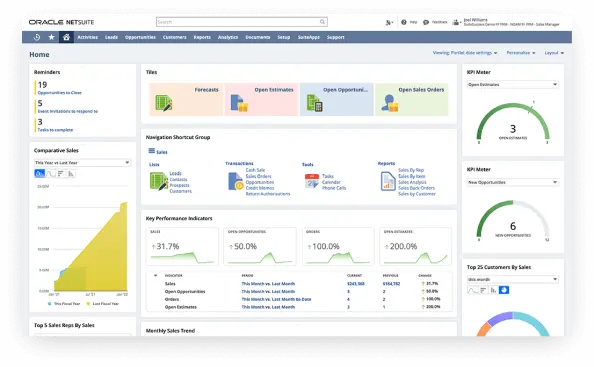 Oracle NetSuite offers solutions for financial institutions of all sizes. With a starting price below $100, it provides an affordable entry point for mid-range financial companies. For larger banks, Oracle NetSuite also offers a premium version, ensuring comprehensive service for low- to high-level financial corporations.
Oracle NetSuite offers solutions for financial institutions of all sizes. With a starting price below $100, it provides an affordable entry point for mid-range financial companies. For larger banks, Oracle NetSuite also offers a premium version, ensuring comprehensive service for low- to high-level financial corporations.
The software’s key features include support for multiple devices, ensuring accessibility across various platforms, and an intuitive interface, making it easy for users to navigate. Oracle NetSuite also includes an automated business intelligence setup, helping banks make informed decisions based on real-time insights.
However, I found that Oracle NetSuite might not be the best fit for every business. Exploring Oracle NetSuite alternatives can help you find other ERP solutions that may better align with your company’s specific needs, offering similar comprehensive features with different customization options or pricing structures.
3. LeaseWave Suite
LeaseWave Suite is designed to manage the full transactional cycle of loans, leases, and mortgages for financial companies. Its automated alarm system alerts users to their due and debited amounts, keeping them informed of their financial status. The software’s dashboard allows the administrative panel to monitor up-to-date transactions.
Based on my experience LeaseWave also offers both front-end and back-end functionalities, facilitating integration between potential parties involved in financial transactions. This makes the loan process easier for all parties.
4. EBANQ
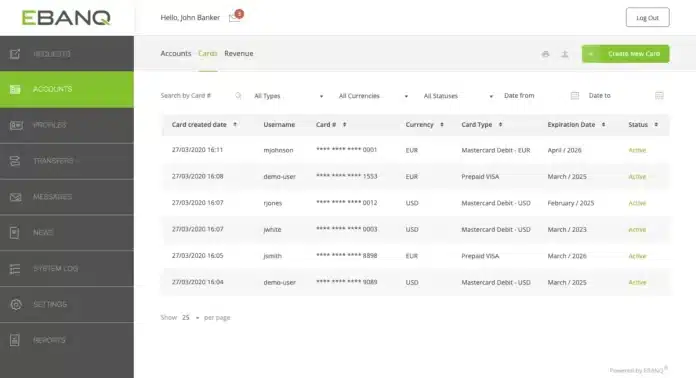
EBANQ is a smart e-application solution tailored to midrange financial industries, particularly focusing on mobile banking and e-payments. Its design facilitates seamless interaction between users and the administrative panel, making it a practical choice for banking operations.
I found that the software stands out for its ease of use, making it a favorite among banking administration and end-users alike. The E-payment system simplifies transactions, while the intuitive interface ensures root-level users can navigate it with ease.
5. Cashbook
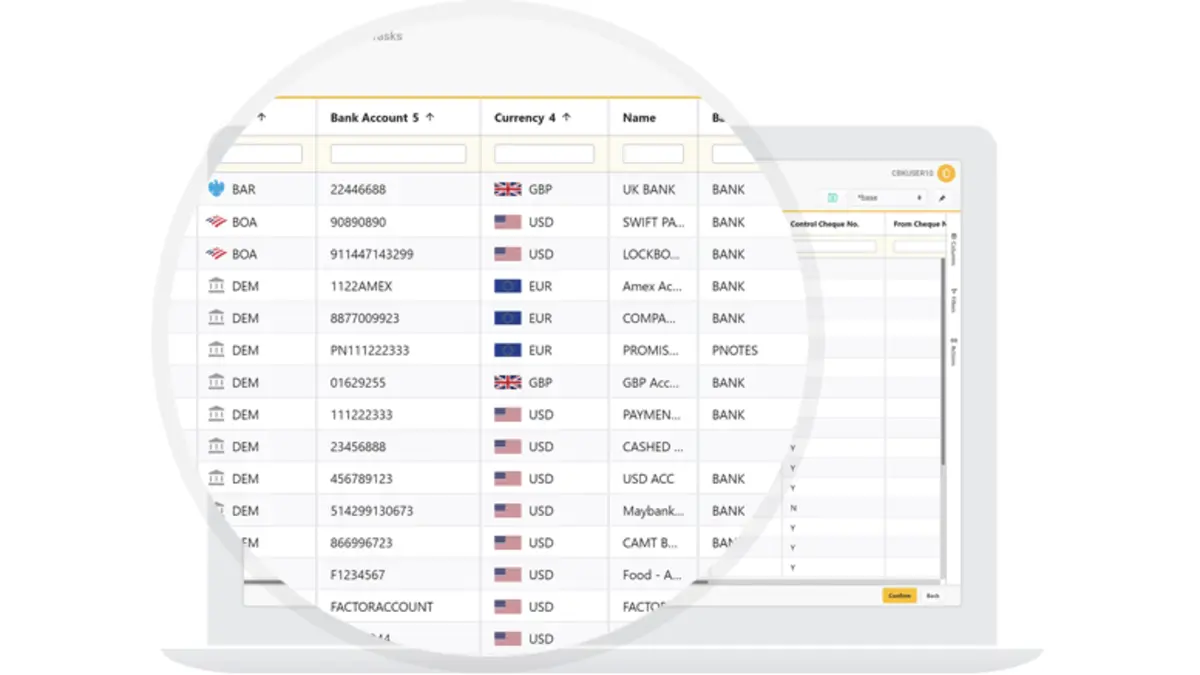
Cashbook is a comprehensive cash management automation software highly regarded for its versatile functionalities. This software efficiently records cash inflow, outflow, and provides instant balance statements, offering real-time insights into financial transactions.
From my experience, one of its standout features is its support for multicurrency, multi-site, and multilingual capabilities, making it particularly popular in the banking sector where diverse currencies and languages are common.
6. Deskera
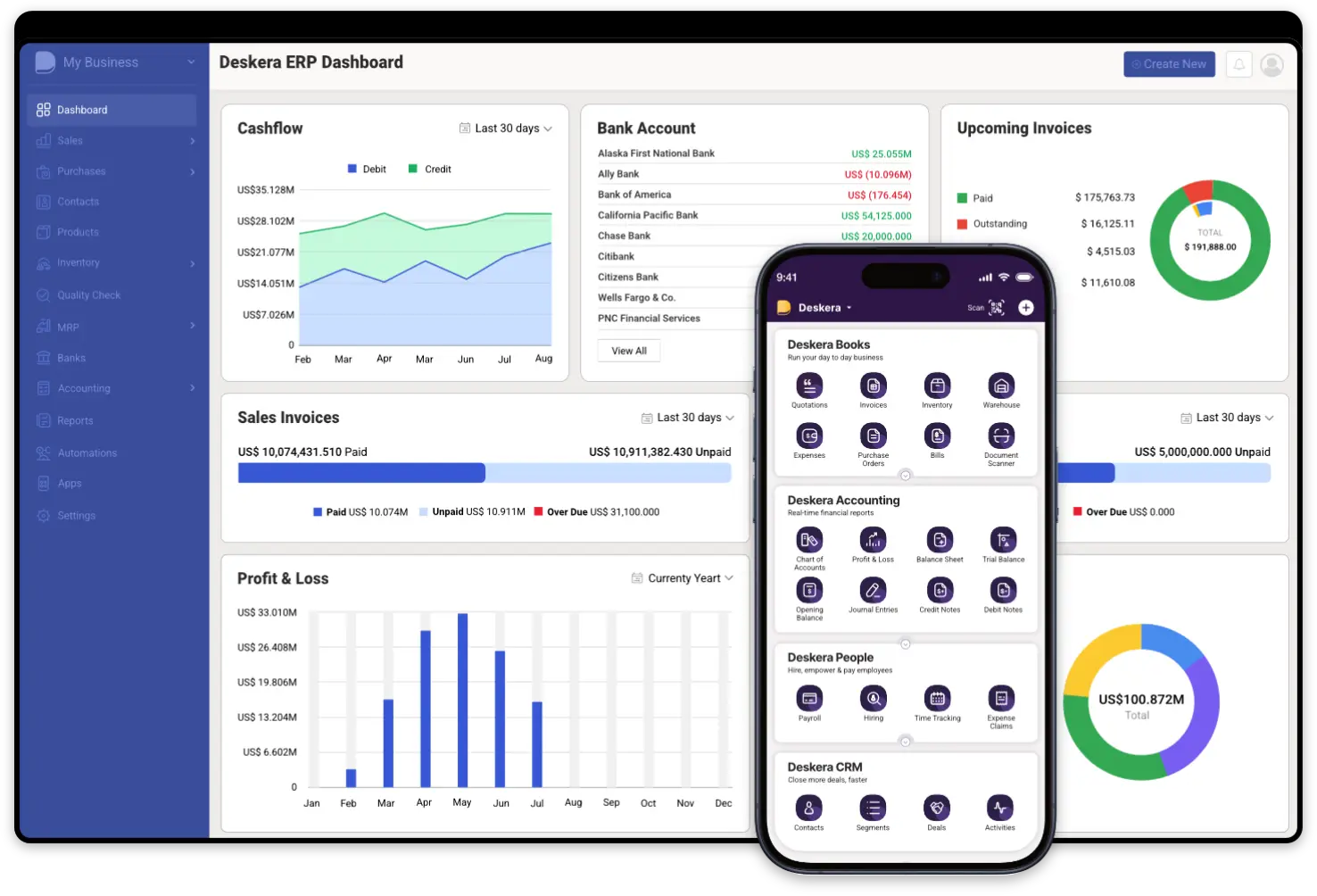 Deskera offers tailored ERP solutions designed specifically for the banking and financial services industry. With a deep understanding of the sector’s unique requirements, Deskera provides the best ERP usage in banking, empowering financial institutions to optimize their operations and stay competitive in a rapidly evolving landscape.
Deskera offers tailored ERP solutions designed specifically for the banking and financial services industry. With a deep understanding of the sector’s unique requirements, Deskera provides the best ERP usage in banking, empowering financial institutions to optimize their operations and stay competitive in a rapidly evolving landscape.
For insurance companies, Deskera’s ERP solutions offer unparalleled benefits, streamlining processes and enhancing efficiency across the board. By leveraging Deskera ERP, insurance companies can manage their financial transactions more effectively and bring their business practices to a standard of excellence.
7. CoBIS Microfinance
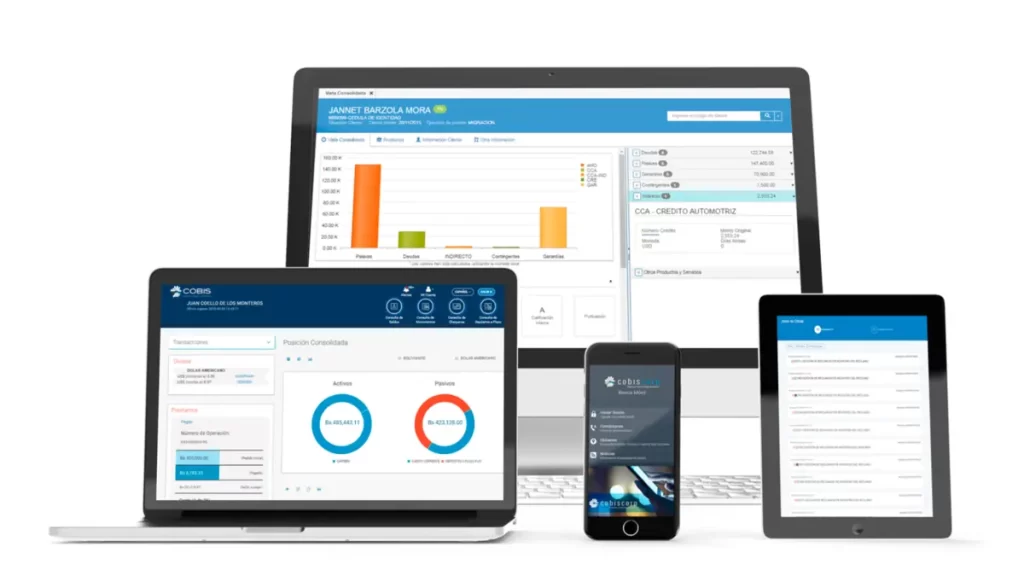
CoBIS Microfinance is a specialized software designed to manage micro-banking and SACCO (Savings and Credit Cooperative) operations efficiently. Its integrated system enables seamless completion of multiple business operations, making it a valuable asset for both users and administrative panels within microfinance institutions.
I found that one of the notable strengths of CoBIS Microfinance is its ability to swiftly handle microservices for users, such as daily savings, term deposits, and shares listings. This capability allows microfinance institutions to cater to the diverse financial needs of their clients with ease.
Conclusion
In the banking industry, the right ERP software can make all the difference in optimizing operations, enhancing customer experiences, and ensuring regulatory compliance. From managing transactions to streamlining administrative tasks, the top ERP solutions highlighted in this article offer comprehensive features tailored to the unique needs of financial institutions.
Among these solutions, I recommend that HashMicro stands out as a trusted partner for banks and financial organisations in Singapore and beyond. With its extensive experience, customizable modules, and exceptional after-sales service, HashMicro provides a robust ERP solution that empowers banks to thrive in today’s digital era.
To experience the benefits of HashMicro firsthand, we invite you to try the free demo. Discover how HashMicro’s ERP software can transform your banking operations, and take the first step towards a more efficient and competitive future with HashMicro today!

FAQ About ERP Software for Banking
-
Why do banks need ERP software?
Banks handle massive volumes of financial data on a daily basis. ERP software ensures accurate reporting, regulatory compliance, automated workflows, and better resource management, which improves decision-making and customer service.
-
How is ERP for banking different from core banking software?
Core banking software primarily focuses on customer transactions and account management, while ERP connects internal operations, including finance, HR, procurement, and compliance, to enhance overall efficiency.
-
What modules are commonly used in banking ERP?
Key modules include Financial Management, Risk & Compliance Management, Human Resource Management, Customer Relationship Management (CRM), and Analytics & Reporting.

































